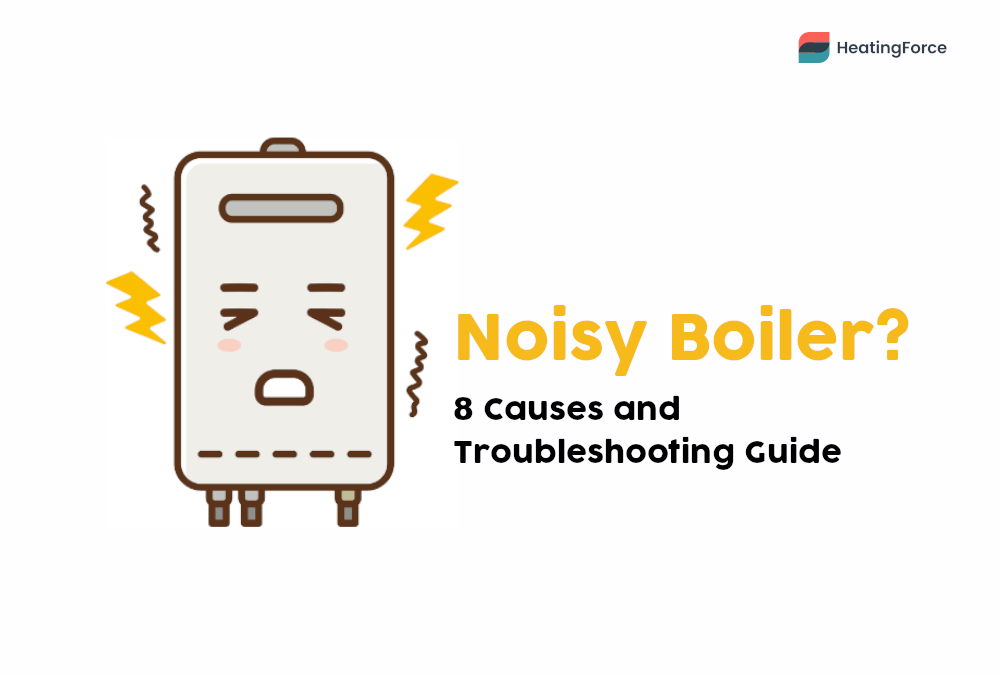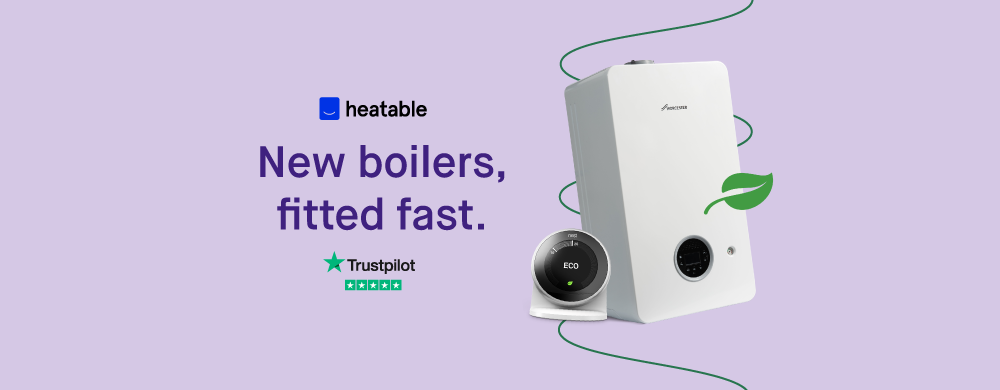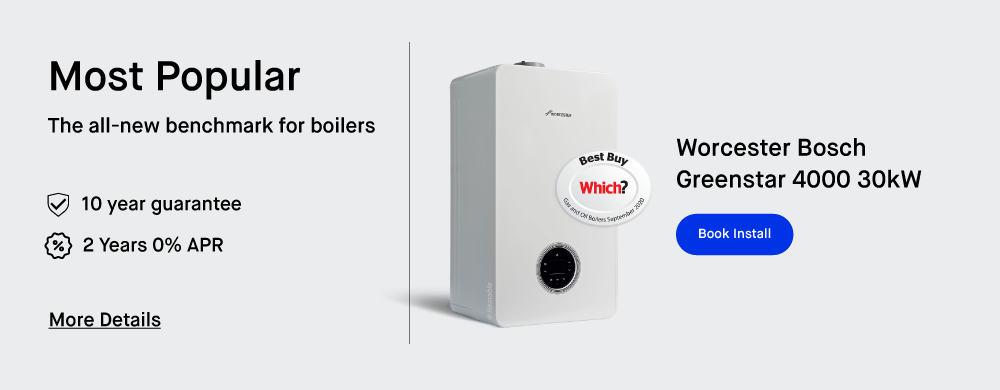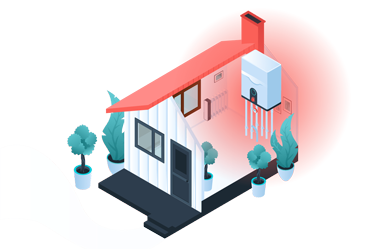Boiler Making Noise? 8 Reasons And Fixes For Noisy Boilers!
Are you struggling to figure out why you have a noisy boiler? A boiler making noise can be incredibly annoying and even dangerous, so we recommend fixing it as soon as possible.
In our 5-minute guide, we’ll cover 7 possible reasons your boiler is noisy, and explain how to fix the underlying issue.

Common Noises From Boilers
Here are the most common sounds you may hear from a boiler making noises:
- Whistling
- Humming
- Vibrating
- Banging and clanging
- Clicking
- Tapping
If you hear any of these noises coming from your boiler, read on and we’ll explain them best we can.
But before we get into the main reasons a boiler can be noisy — is your boiler old, out of warranty, and breaking down often? If it is, and you’d rather invest cash in a replacement boiler than repair your deteriorating one, head over to Heatable. Their expert installation is available at a low cost, backed by a 10-year warranty, and comes out fast within 24 hours of your request.

7 Reasons Boilers Make Noise
Below are the primary causes behind a noisy boiler. And if you don’t think that your problem is listed, you can check out our guide to the top boiler problems.
#1 – Limescale Build-up or Faulty Heat Exchanger
You may hear: boiler kettling, whistling, banging, clanging
Limescale build-up in pipes, connections to the boiler, and even the heat exchanger is common in hard-water areas. This build-up may cause boiler whistling and kettling, but banging and clanging are common, too.
The limescale will attach itself to boiler components and the pipework connected to the boiler. As a result, hotspots where hot water reaches higher temperatures will appear. When steam bubbles pop, they’ll create kettling, tapping, banging and clanging noises, depending on how severe the issue is.
If your boiler is making a whistling, kettling, or gurgling noise, there’s a good chance that there’s an issue with the heat exchanger.
Limescale buildup in the heat exchanger is a serious issue that may require you to replace your heat exchanger or even the boiler itself. Unfortunately, even the best boiler care policies generally exclude limescale-related damage from their list of covered items, so you’ll have to pay out-of-pocket.
The Fix: Eliminate limestone
Speak with an engineer, and ask them to determine whether the issue is with the heat exchanger or another part of your heating system.
Either way, limescale is notoriously hard to remove. You’ll need to get some central heating inhibitor, dose the system and flush the system out. This will remove a good chunk of limescale, but not all of it — older build-up may remain and the gurgling noises will continue.
Once you’ve flushed the system, fit a limescale reducer (also known as a scale reducer) to achieve the optimal result. This will help to catch any limescale that passes through the system in the future, preventing further clunking and banging noises.
Keep in mind that the approach above may not be sufficient to remove limescale from your heat exchanger, which may be at the point of cracking if it suffers from massive limescale build-up.
Unfortunately, heat exchangers are not particularly cheap to replace. Including parts and labour (depending on the boiler), a new one could cost as much as £500. If your boiler is out of warranty, it might be worth investing in a new one instead. You can get a brand new Worcester Bosch fitted with a 10-year warranty at Heatable.

#2 – Central Heating Sludge Build-Up
You may hear: kettling, whistling
Heating sludge build up occurs in all heating systems, and is a common culprit behind a noisy boiler.
As the interior of boiler components, radiators and pipework deteriorates, it breaks off into heating sludge or attaches itself to parts in the boiler.
Sludge that’s broken off and travelling around your system will make tapping, trickling and clicking noises. That’s the particles hitting the sides of pipes and radiators.
The Fix: Flush the sludge from the heating system
Luckily, heating sludge is much easier to get rid of than limescale. Here’s what you’ll have to do:
- Dose your system with inhibitor and cleaner to break down the sludge.
- Flush (hot flush for older systems that might be prone to leaks, a stronger powerflush for newer systems) the sludge from the system.
- Fit a boiler filter to catch heating sludge.
- Ask your boiler engineer to clean out the boiler filter at each service.
What kind of fuel does your boiler use?
Fixed price online with next day installation
#3 – Low Water Flow Rate & Pressure
You may hear: banging, clanging
Low water flow and a loss of boiler pressure could contribute to the problems your noisy boiler is experiencing. Pressure loss typically stems from boiler leaks.
Much like water hammering, the sudden lack of circulation and pressure followed by sharp boosts of pressure will create banging and clanging noises in the pipework.
The Fix: Increase the flow rate
If a boiler loses pressure, it’s got a leak; you can diagnose a boiler leak and fix the problem here.
Meanwhile, the low water flow rate could be due to the heating pump being on a low setting, or internal parts that got seized. Most pumps have a flow rate setting on the top of the pump; increasing the flow rate will help to stop your boiler from making noises when it’s on.
#4 – Airlock In The Boiler Pump
You may hear: banging
Airlocks in central heating systems are common. And if you have an airlock in your heating pump, you may hear a banging noise coming from your boiler. Typically, you’ll hear this sound a few minutes after your turn on the boiler or when running hot water.
The Fix: Release air
Quality pump manufacturers fit a bleed screw to their pumps; you can release the air from the pump here. This will usually stop the boiler banging.
#5 – Ignition Failure
You may hear: clicking, light tapping
Is your noisy boiler not working or firing up? If so, there’s a good chance you’re hearing clicking sounds or a light tapping.
This is an ignition fault — the noise you’re hearing is the boiler trying to ignite and failing.
The Fix: Get a boiler professional to check the system
Have a boiler engineer come and diagnose the fault, which could be related to problems such as:
- Lack of gas supply
- Faulty ignition leads or probe
#6 – Boiler Pump Components Seized
You may hear: humming, vibrating
If you’re wondering, “Why is my boiler making a loud vibrating noise?” there’s a good chance there’s a seized part on the pump.
If this is the case, check the pump; it should be warm, but not hot.
If it’s hot to touch, there’s likely a seized component.
Pumps make humming noises and slight vibrating noises as they operate, so it’s important to check this isn’t just it’s normal operating noise level.
The Fix: Make sure the boiler pump is clean
As a temporary fix, tap the pump gently. This should free up the components enough to let the motor do its job and stop your boiler from making a loud noise.
That said, you still need to find the cause of the problem. Usually the fault relates to limescale or sludge build up (see #1 and #2), and the pump needs to be thoroughly cleaned.
#7 – Pipework Noises
You may hear: tapping, clicking, knocking, banging
Is your boiler noisy when switched off? And, is the noise limited to the boiler, or can you hear noises coming from the central heating pipes? The issue may be with the heating pipes.
The Fix: Identify the noises
We’ve created a detailed guide to noisy central heating pipes here.
Ways to Quiet Down a Noisy Boiler
In summary, let’s cover a few things you can do to reduce boiler noises that including tapping, banging and even humming:
- Add central heating inhibitor, a scale reducer (in hard water areas), and a boiler filter. If the heat exchanger is clogged up, get an engineer’s advice on the right course of action.
- Have a heating engineer do a hot-flush, or power flush of your heating system.
- Check the boiler for leaks, operating pressure, and water flow rate.
- Remove airlocks in the boiler’s heating pump.
- Inspect the heat exchanger for limescale build up.
- Test the ignition leads and probe to see if they are faulty.
- Assess whether the boiler pump is seized.
FAQs About Noisy Boilers
Below, we’ll address some common questions about noisy boilers.
Why is my boiler noisy?
If you hear that noise is coming from your boiler, it could be for a variety of reasons, including limescale buildup, low water pressure, worn pump bearings, clogged flue or air intake, and other reasons.
Each of these problems manifests itself in a slightly different noise — you can read about the noises here.
How do I stop my boiler from making noise?
Since different problems can result in different noises coming from your boiler, job one is to identify what the underlying problem is behind the noise. Such an investigation will require a thorough inspection of the boiler’s components, so you’ll need to hire a Gas Safe heating engineer to run diagnostics on your appliance.
Once the cause of the noise has been established, the Gas Safe engineer can recommend a fix. If you’re lucky, all you’ll need to do is get some trapped air out of the boiler system.
However, if it’s your boiler’s heat exchanger that’s producing the noise because of limescale build-up, you may have to replace the part altogether. If this happens to a boiler that’s old and out of warranty, you may want to explore quotes for a new boiler. Otherwise you’ll pay several hundred pounds to install a new heat exchanger into a boiler that’s already on its way out.
The Gas Safe engineer will be able to suggest the optimal way forward.
Can your boiler explode?
It’s highly unlikely, but not out of the realm of possibility.
Unlike older boilers, which weren’t designed to handle excessive pressure, their newer counterparts are fitted with pressure relief mechanisms that help the boiler cope with immense pressure forces. That said, if you check the water pressure gauge and see the needle rising above 2 bar, you should seek help from a Gas Safe registered engineer.
How do you release trapped air from a boiler?
If your boiler has air in the system, it’s most likely trapped in the pump and is causing the boiler to make a banging noise. Luckily, the air release proceedure is simple — most pump manufacturers include a bleed screw, which you can easily turn to let the airlock come out. You can read more about the procedure here.
When should I worry about my boiler?
When you boiler develops any problems that impede safe function — for example, a pilot light that has stopped working, or a faulty gas valve — call a Gas Safe to inspect your appliance right away.
That said, you may be able to sort out some safety-related boiler issues on your own. For instance, if your boiler has stopped working because of a frozen condensate pipe, you can typically unfreeze the pipe by pouring lukewarm water over it.
Ready to get your boiler noise fixed? Get a quick quote here.
Can’t Fix Your Noisy Boiler?
If your boiler system continues to make noise despite attempted repairs, it’s probably because the appliance is old and the issue is irreparable at this point. And if that’s the case, and further repairs are probably a waste of your money and time.
So, if your faulty boiler is old, out of warranty, and incurring frequent repair bills, it may be time to consider spending money on a fitting a new boiler.
Heatable are a good place to start. The online boiler installation company have a nationwide network of Gas Safe installers, yet their overhead is so low that Heatable can offer amazing prices on a range of top-tier boiler models.
All you have to do is fill out Heatable’s anonymous questionnaire about your property and central heating system, and you’ll get fixed-price boiler quotes on the likes of Worcester, Viessmann, Ideal, Alpha, and other boiler brands and models.

What’s Next?
Whether your noisy boiler is making banging, crashing, or tapping noises, I hope this has helped.
Still have questions? Add a comment below and we’ll get back to you as soon as possible.
